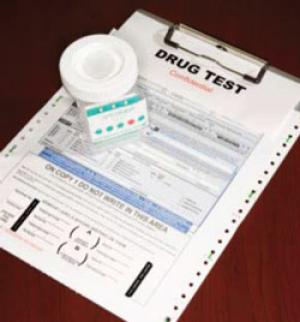This year is shaping up to be a busy one for marijuana legalization and decriminalization bills at state houses around the country. Here's the rundown on what's going on so far.
The New Mexico legislature has commissioned a study of emerging and evidence-based harm reduction practices, including supervised injection sites. That could lead the way to a pilot program there. There is also agitation for SIJs in San Francisco and New York City.
A life sentence for growing a pot plant!? It just happened to a Malaysian couple, but, hey, at least the judge suspended the caning.
Bills that would require state legislators to undergo drug tests have been filed in Missouri and Tennessee. They're an unsurprising extension of the drug testing mania that has gripped statehouses, but likely unconstitutional.
The Colorado Regulate Marijuana Like Alcohol initiative hit a bump in the road Friday, falling just short of the number of valid signatures needed to make the November ballot. But it still has 15 days to make up the shortfall.
A California medical marijuana regulation initiative is polling right on the cusp of where potential major donors start to feel comfortable.
With decriminalization bills pending in Rhode Island, a new poll shows strong support for decrim and even majority support for legalization.
Busy, busy, busy, at every level from federal rescheduling through bills in the states to local decision-making. The medical marijuana world continues to be very active.
An NYPD narc shot and killed a teenager in his own home as he tried to flush a small amount of marijuana down a toilet. The local community was not happy.
A desert drug raid in California has resulted in the year's seventh drug war killing, and it's only the beginning of February.
Two of our four bad apples this week come from the Big Apple, one for planting drugs and one for transporting them. Of the other two, one picked the wrong friends and the other picked the wrong wife.
Events and quotes of note from this week's drug policy events of years past.
State legislatures have convened or are convening all around the country, and once again this year, marijuana decriminalization or legalization are hot topics at the statehouse. Legalization bills are pending in three states (as well as on the ballot as initiatives in Washington and almost certainly Colorado), decriminalization bills are alive in nine states, and bills that would improve existing decriminalization laws have been filed in two states.
And this is still early in the legislative season. Bills can still be introduced in many states, and bills that have already been introduced can advance or be killed. By around the beginning of May, a clearer picture should emerge, but 2012 is already looking to be even more active than last year when it comes to decriminalization and legalization bills.
There's a reason for that, said leading reformers.
"We're seeing more bills introduced, and they're having stronger and more sponsors," said Karen O'Keefe, state policy director for the
Marijuana Policy Project (
MPP). "We're also seeing more and more public support for decriminalization and legalization. We're approaching critical mass as more and more people see marijuana prohibition as a failed public policy, and in legislatures because of fiscal constraints and changing public sentiment."
"Each year, these bills are easier to introduce, there is less controversy, and the media reaction is generally neutral to positive," said Allen St. Pierre, executive director of
NORML. "Baby boomers, medical marijuana, the Internet, and the state of the economy have all had an impact, even, finally, on legislators and their staffs," he explained.
"Before 1996, nobody invited
NORML; now our staff is regularly going to meetings requested by legislators around the country," St. Pierre recalled. "First, we couldn't get them to return our phone calls; now they're calling us. Everything is in play because of activists around the country doing years of work."
That contact with legislators has led to results, St. Pierre said. "We've been involved in almost all of this legislation. Either we helped write it or legislators contacted us for deep background and we're testifying at public hearings on these bills."
MPP has been busy, too, O'Keefe said. "We have paid lobbyists in Rhode Island and Vermont, and one of our legislative analysts, Matt Simon, is from New Hampshire and has been working on bills up there," she said.
Perhaps not surprisingly, O'Keefe thought the prospects of passage were best in Rhode Island and Vermont. "In Rhode Island, more than half of both chambers are cosponsors of the decriminalization bill, while in Vermont,
Gov.
Shumlin has been very supportive, and for the first time we have a Republican sponsor in the Senate -- we already had one in the House," she said.
Getting a marijuana bill through a state legislature is a frustrating, time-consuming process, and there is a chance that none of these bills will pass this year. But there is also a chance some will, and some will pass eventually, if not this year, next year, or the year after.
Here is what is currently going on around marijuana law reform at the state house (compiled from our
Legislative Center, with additional information from
MPP's list of bills and from
cantaxreg.com):
Legalization Bills
Massachusetts
Thirteen months ago, Rep. Ellen Story introduced
House Bill 1371, which would allow the legal and regulated sale of marijuana to adults. It was referred to the Joint Committee on Judiciary then, and it is still pending. A
hearing is scheduled on March 6.
New Hampshire
Last month, Rep. Calvin Pratt (R) introduced
HB 1705, which would allow people 21 and over to possess up to an ounce and allow for regulated retail and wholesale sales. Marijuana would be taxed at a rate of $45 an ounce at wholesale and at 19% of the wholesale price at retail. The bill is now before the House Criminal Justice and Public Safety Committee.
Washington
Last year, Rep. Mary Lou Dickerson (D) and 13 cosponsors introduced
House Bill 1550, which would replace prohibition with regulation. It and a companion bill, Senate Bill 5598, are still both alive. Dickerson's bill is pending in the House Committee on Public Safety & Emergency Preparedness.
Decriminalization Bills
Arizona
On January 9, Rep. John Fillmore (R) filed
House Bill 2044, which would make possession of up to an ounce of marijuana a petty offense punishable by up to a $400 fine. Simple possession is currently a Class 6 felony in Arizona.
Hawaii
In March 2011, the Hawaii Senate passed
Senate Bill 1460, which would reduce the penalty for possession of less than an ounce to a civil fine capped at $100. The current law specifies a jail stay of up to 30 days and a $1,000 fine. That bill was carried over and is now before the House Health, Public and Military Affairs, and Judiciary committees. Also carried over is
House Bill 544, which would make possession of less than an ounce a violation instead of a misdemeanor and impose a maximum $500 fine. That bill is before the House Judiciary Committee.
Illinois
In January 2011, Rep.
LaShawn Ford introduced
House Bill 100, which would reduce the penalty for possession of up to 28.35 grams of marijuana to a $500 fine for a first offense, $750 for the second, and $1,000 for a subsequent offense. It would also reduce the charge from a misdemeanor to a petty offense. Under current law, possession of up to an ounce can be penalized with up to six months in jail and a $2,500 fine. The bill has been referred to House Rules Committee, and is still alive in Illinois' two-year session.
Indiana
Last month, Sen. Karen
Tallian introduced
Senate Bill 347, which would reduce several marijuana-related penalties, including by making possession of up to three ounces of marijuana a civil infraction, punishable by up to a $500 fine and court costs. SB 347 was referred to the Committee on Corrections, Criminal, and Civil Matters.
New Hampshire
Last week,
House Bill 1526, which would decriminalize possession of up to an ounce, got a hearing in the Criminal Justice and Public Safety Committee. Sponsored by Rep. William
Panek (R),the bill would mandate a maximum $100 fine. It also provides for notification of parents of minor offenders, who could be ordered to attend a drug awareness program.
New Jersey
Last month, Assemblyman Reed
Gusciora (D) introduced
Assembly Bill 1465, which would reduce the penalty for 15 grams or less of marijuana to a civil penalty. The first violation would be punishable by a $150 fine, $200 fine for a second offense, and $500 after that. Any adult caught three times would be ordered to undertake a drug education program, as would any minor regardless of prior offenses. The bill is currently before the Assembly Judiciary Committee.
Rhode Island
Last month, more than half of the Rhode Island House of Representatives cosponsored Rep. John Edwards' bill to fine adults for simple possession of marijuana and to sentence minors to drug awareness classes. The bill,
House Bill 7092, was referred to the House Judiciary Committee. Current law provides for up to a year in jail and $500 fine; the bill would make it a civil offense with a maximum $150 fine.
Tennessee
In February 2011, Rep. Mike
Kernell introduced
House Bill 1737, which would reduce the penalty for less than 1/8 of an ounce of marijuana to a fine between $250 and $2,500. Possession would remain a Class A misdemeanor, but the bill would remove the possibility of a year-long jail sentence. Fines would remain the same. A companion bill, Senate Bill 1597, has been referred to the Senate Judiciary Committee. Both bills remain alive in the state's two-year legislative session.
Vermont
Last year, a tri-partisan group of legislators led by Rep. Jason
Lorber filed
House Bill 427, which would reduce the penalty for adults' possession of up to an ounce of marijuana to civil fine of up to $150. Minors would be sent to drug education and community service for a first offense, as would adults under 21 convicted of a second or subsequent offense. The current penalty for first offense possession of marijuana is a fine of up to $500 and/or up to six months in jail. Second offense possession is currently punishable by up to two years in prison and/or up to a $1,000 fine. The bill is still alive in the state's two-year legislative session. Last month, Sen. Joe
Benning (R) and Sen. Philip
Baruth (D) filed
Senate Bill 134, which would reduce marijuana penalties, including by reducing the penalty for possession of up to two ounces of marijuana to a civil fine of up to $100. It has been referred to the Senate Judiciary Committee.
Decriminalization Improvement Bills
New York
Last year, legislators filed bills aimed at removing New York City's reputation as the world's marijuana arrest capital. The state's current decriminalization law creates an exception for marijuana possessed in a public place and which is burning or open to the public view. The NYPD has used that exception to arrest more than 50,000 people a year on misdemeanor charges instead of issuing them tickets. In May, Sen. Mark
Grisanti (R) filed
Senate Bill 5187, while Assemblyman
Hakeem Jeffries introduced a companion bill, A 7620. Both bills were referred to their chambers’ Codes Committees and are still alive.
North Carolina
A bill that would reclassify possession of an ounce as an infraction instead of a misdemeanor has been filed in North Carolina.
HB 324 increases the
decrim amount from a half-ounce, but removes the automatic suspended sentence for a first offense.
Twelve states have decriminalized marijuana possession so far (and possession in small amounts at home is legal under the Alaska constitution), but between an initial burst of reform activity in the
1970s and Nevada's decriminalization in 2002, there were three decades of stagnation. Since then, three more states- -- California, Connecticut, and Massachusetts -- have come on board, and chances are more will follow shortly, Legalization remains a tougher nut to crack, but so far, there are opportunities in five states this year.
back to top
In a groundbreaking move, the New Mexico legislature has approved a proposal to study how to enhance and expand the state's already cutting edge harm reduction programs, including a look a medically supervised injection sites (SIJs -- sometimes also known as safe injection sites) for hard drug users. That could clear the way for an eventual SIJ pilot program to operate in the state, although considerable political and legal hurdles remain.
The legislation,
Senate Memorial 45, was sponsored by Sen. Richard Martinez, whose constituency includes Rio
Arriba County, which has a drug overdose fatality rate five times the state's rate. The state's rate is double the national rate, making New Mexico the nation's leader in drug overdose-related deaths per capita.
"These deaths are preventable," said Martinez. "Overdose spares no one and affects everyone, especially families."
State health officials estimate the state has at least 24,000 injection drug users. Other estimates put that figure as high as 50,000.
The memorial, which was also endorsed by the New Mexico Public Health Association, passed the Senate on a 43-0 vote Monday night and does not need any further action to go into effect. It directs the University of New Mexico's Robert Wood Johnson Foundation Health Policy Center to undertake the study of emerging and evidence-based harm reduction approaches, including
SIJs, and report back to the legislature by November 1.
"Sadly, our drug overdose epidemic has outgrown our current harm reduction approaches," said Emily
Kaltenbach, director of the
Drug Policy Alliance (
DPA) New Mexico office. "On Monday, our state senators realized this and did not let politics trump science. They clearly stated their intent to go beyond the status quo and explore innovative strategies to help New Mexico’s families."
"Wow, getting something like that on the state level is huge," said Hilary
McQuie, Western director for the
Harm Reduction Coalition (
HRC). "New Mexico once again takes the lead in state harm reduction efforts; it's one of the few states to take a statewide approach to these things."
"Heroin is still the number one cause of
ODs here, but we're also seeing a high number of prescription drug overdose deaths," said
Kaltenbach, "so I'm incredibly encouraged that the legislature is willing to look beyond the status quo and start studying proven programs like supervised injection sites. We're hoping to study the feasibility and legal and ethical implications, leading to a pilot site in New Mexico."
If that actually happens, it would be the first
SIJ in the nation. Although
SIJS are operating in at least 27 cities around the world, including Vancouver and Sydney, and have been proven to reduce the spread of HIV, Hep C, and other blood-borne diseases, as well as prevent overdoses, without increasing criminality or drug use, political and legal obstacles in the US have so far prevented them from spreading here. They face morality-based opposition as well as federal issues including a "crack house law," which bars anyone from knowingly allowing others to use controlled substances.
"These same sorts of issues came up when syringe exchange programs were first discussed," said
Kaltenbach. "I think the legal issues can be overcome, but the states have to be willing to look at it as an extension of syringe exchange. This study will address those issues."
While New Mexico is the first state to order a study of
SIJs, it isn't the only place in the country where they are on the agenda. In San Francisco, drug user groups, activists, and advocates are working toward winning approval for one there, while in New York City, a similar effort is going on.
"The biggest obstacle is the perception of legal barriers," said
DPA's Laura Thomas, who has been working on the San Francisco effort. "We have these crack house statutes, as well as state laws, that say it's illegal to knowingly allow people to use controlled substances. We have to figure out if there's room for a research project, like in Sydney, or create an exemption, like in Vancouver, or get a state law passed, like in New Mexico. We need a ruling that says 'yes,' this is not a violation."

Richard Martinez
In the meantime, the achingly slow process of building political support for an
SIJ, or at least a feasibility study, goes forward. A year ago this week, a city Hep C task force recommended looking at
SIJs. That followed on a similar recommendation from the city's HIV coalition.
"We continue to try to build support for a safe injection site," said Thomas. "During the mayoral campaign last year, at one of the candidate forums, they were all asked if they would support evaluating whether it would work for San Francisco, and most of them said they did, including our current city attorney, Dennis Herrera."
But despite the recommendations and expressions of support, nothing has happened yet. The
San Francisco Drug Users' Union is trying to change that.
"We will be pressing the Board of Supervisors to study the possibilities," said the group's Isaac Jackson. "We're also doing a
SIJ community design competition, a project in community
imagineering. We'll give the winner a nominal prize and we'll present the winning design to the Board," he said.
"We think the city's Human Rights Commission will recommend safe injection sites in April," said
HRC's McQuie. "But there have been other bodies and other recommendations. It's a matter of where the political will is and the priorities are."
For
HRC, said
McQuie, getting a safe injection site up and running in San Francisco is a back burner issue right now, but that could change.
"We have a lot of really great harm reduction projects going on, like the
DOPE Project, that aren't getting financial support, and while there was a lot of enthusiasm for awhile about working toward a safe injection site, we kept planning meetings, but nobody would show up. It didn't feel like the energy was there. If the San Francisco Drug Users' Union wants to take some leadership, we would be happy to support it," said
McQuie. "I think we will be going back to San Francisco and asking somebody to do something on this issue, but we're not sure who yet."
On the other side of the country, street-level activists are aiming for an
SIJ in New York City.
Citiwide Harm Reduction in the South Bronx, which is on the verge of opening the city's first fully staffed primary care clinic at a syringe exchange, is preparing to build a full-scale model of an
SIJ at its 144
th Street building. It may seem like performance act, but its purpose is educational.
"Our inspiration is the Smithsonian museums, where you can go inside the cockpit of the space shuttle," said
Citiwide executive director Robert
Cordero. "People have this grisly misconception of what a safe injection site would be like, and we want them to be able to have this Smithsonian experience here in the Bronx."
Such a model could be quite useful in educating elected officials and law enforcement,
Cordero said.
"
SIJs are a humane public health approach to reducing overdoses, HIV, Hep C, and crime, and can provide compassionate care for addicted people until they are ready to get into treatment," he said. "Do we want that, or do we want them just hanging out in front of the bodegas on 149
th all day?"
Citiwide isn't going it alone on agitating for
SIJs, and it isn't even taking the lead. Instead it is working with groups like
HRC and the
Vocals-NY Users' Union in a broader campaign.
"We're not trying to be the
HRC or Vocals-NY," said
Cordero. "We advocate through demonstrating what it would be like while partnering with others who are advocating every day. Our effort is to build the
SIJ model, and when anyone comes to New York who is interested in these issues, there can be an educational moment."
Supervised injection sites are not a reality yet in the US, but pressure for them is mounting. Whether it's New Mexico, New York City, or San Francisco, one of these years someone is going to lead the US into the ranks of nations that understand their utility -- and their humanity. New Mexico has just taken a giant step, but let's hope it has to move fast to beat San Francisco and New York.
back to top
A Malay court in Kuching, Sarawak Province, has sentenced a married couple to life in prison for possessing less than a half-ounce of marijuana and having a pot plant in their home. The husband was also sentenced to nine lashes of the cane.

Kuching, Sarawak Province, Malaysia
Judge
Afidah Abdul
Rahman imposed the life sentence on
Tajol Ashikin Tambi, 39, and wife
Rozaimah Mat, 37. They were convicted under Section 6 of Malaysia's Dangerous Drug Act of 1952, which pertains to marijuana.
The man and wife were each convicted of two offenses, marijuana possession and marijuana cultivation. They were sentenced to three years each for possessing 20 grams of pot (less than a half ounce) and sentenced to life in prison for growing a marijuana plant.
They were arrested a year ago. They claimed their elder child had planted the marijuana plant without their knowledge, and they brought it in the house because it was "dangerous."
Their defense attorney,
Voon Lee Shan, asked for leniency, citing the couple's two children, ages four and seven. But Judge
Afidah Abdul
Rahman demurred, saying the couple was "in denial" in claiming their child had planted the marijuana plant.
Prosecutor
Hasyutantee Khalil argued against leniency, saying the public interest had to be taken into account and that the couple had failed as parents by involving their children in the case.
Tajol stoid stoicly as the sentence was pronounced, but his wife broke down in tears.
Malaysia has some of the world's harshest drug laws, including the death penalty for some offenses, including some marijuana offenses. On the up side, at least the judge suspended the caning.
back to top
Awash in a whirlpool of proposals to subject welfare recipients to drug tests, legislators in two states, Missouri and Tennessee, are proposing that legislators themselves should undergo drug tests. In Missouri, a welfare drug testing bill was signed into law last year, while in Tennessee, a plethora of drug testing bills are currently before the legislature.
They are only two of about three dozen states that have seen drug testing bills aimed at welfare recipients, recipients of unemployment benefits, or other public beneficiaries introduced in the past year. But they are among the first to see the push expand to target legislators.
In Missouri, Rep. Rick
Brattin (
R-Harrisonville) has introduced
House Bill 1225, which would require members of the General Assembly to undergo random,
suspicionless drug testing at their own expense during the legislative session. Members who test positive for illegal drugs or drugs not lawfully prescribed would be immediately removed from office and barred from seeking elected office again for two years.
"Hardworking taxpayers don’t want their money to be subsidizing other people’s drug use," said Rep. Ellen
Brandom (
R-Sikeson) last year, explaining her push to test welfare recipients.
What's good for the goose is good for the gander, said Rep.
Brattin. "I think we should live by the same standard we are asking others to live by," he told the
Kansas City Star. "Our salaries are paid by taxpayers, so we should assure them we aren't using that money on drugs."
The bill has been assigned to the House General Laws Committee, but it has not yet been scheduled for a public hearing.
Meanwhile, across the Mississippi River in Tennessee, two Democratic legislators, state Rep. Johnny Shaw and state Sen. Reginald Tate, are backing a bill,
House Bill 2433 and its Senate companion bill, SB 3524, which would require the speaker of each chamber of the general assembly to develop and implement a drug testing program for legislators and staff.
Under the bills, state legislators and staff would be subjected to random,
suspicionless testing for drugs and alcohol. A positive test result or a failure to take the test would be referred to the leadership of the chamber for disciplinary action.
They said the bill was in response to numerous Republican bills calling for drug testing for welfare recipients, workman's compensation recipients, state employees, private sector employees, and even making it a crime ("internal possession") to fail a drug test.
"I don’t think lawmakers should ever vote to make any laws they don't first and foremost abide by," Shaw told the
Associated Press. "My question is, what lawmaker would not vote for it?"
House Majority Leader Gerald McCormick (R-Chattanooga) might be one. He told the AP drug testing legislators wasn't his highest priority. "Most people would like to see people who don't work for their government paychecks to get tested first," he said.
The bills to drug test politicians make for good statehouse politics, but even if they were to pass, they are probably doomed. In a 1997 decision,
Chandler v. Miller, the US Supreme Court threw out a Georgia law requiring drug tests for elected officials, saying it violated the Fourth Amendment's proscription against warrantless searches.
back to top
The Colorado secretary of state Friday informed the Campaign to Regulate Marijuana Like Alcohol that its signature-gathering drive to place a marijuana legalization initiative on the November ballot had fallen just short. But that's not the end of the effort -- the campaign has 15 days to collect enough valid signatures to cover the shortfall, somewhere between 2,500 and 3,000.
The campaign had handed in more than 159,000, nearly twice the 86,000 valid signatures required to make the ballot. But the secretary of state's review of the signatures found an unusually high number of invalid ones, leaving the campaign just short.
The campaign said Friday it was confident it could get the required signatures. "Given that we collected an average of 3,000 valid signatures per week during the first six months of the petition drive, we are confident we will complete this process successfully," it said. "In fact, we intentionally started the initiative process early to ensure we would have this curing period if necessary."
The initiative would legalize the possession of up to an ounce of marijuana and six pot plants for people 21 and over. It would also create a regulated legal framework for commercial marijuana operations, including retail sales.
A marijuana legalization initiative has qualified for the November ballot in Washington state. Efforts are in the signature-gathering phase in California, Michigan, Missouri, and Oregon.
back to top
A medical marijuana initiative aiming at the November ballot found nearly 60% support in a poll conducted last week. The Probolsky Research poll reported that 34.5% of respondents would "definitely vote yes," 22.5% would "probably vote yes," and 2.3% were "leaning toward" a yes vote.That comes out to 59.8% saying they favor the initiative
The initiative, the
Medical Marijuana Regulation, Control, and Tax Act (
MMRCTA) would impose comprehensive, statewide regulations on medical marijuana distribution. The act would create a state medical marijuana board, require all dispensaries and commercial cultivation operations to be licensed after July 1, 2013, and impose a 2.5% state medical marijuana sales tax. (For more detail on the initiative, see our recent feature article
here.)
Only 23.6% of respondents would definitely vote no, with another 9.7% who would probably vote no, and an additional 2.0% who were leaning toward no, for a total "no" vote of 34.3%. Some 5.5% of respondents were either decisively uncertain or refused to answer.
The question respondents answered was directly about the
MMRCTA: "The California Medical Marijuana Regulation Act may appear on the November ballot in California. It reads: 'Creates a state enforcement division to regulate and control all entities involved in the commercial cultivation, manufacture, distribution, and sale of medical marijuana in California; requires their mandatory registration with the state; and establishes a state excise tax of upon all medical marijuana grown for sale in California.' If the election were held today, would you vote Yes to approve or No to reject this initiative? And would you say that you would definitely vote [yes/no] or probably vote [yes/no]? If unsure, would you say that you lean one way or another?"
Only limited additional polling data is available at this point, but
Probolsky did provide data on where support for the initiative was strongest: among Democrats (65.8%), unaffiliated voters (67.4%), foreign-born voters (67.5%), Asian voters (66.7%), and those who feel California is on the right track (68.4%). Democratic voters over age 55 are especially supportive at 70.0%.
The poll was conducted last week in English and Spanish using landline and cell phones. A total of 750 surveys were recorded, yielding a margin of error of +-3.7%.
The
MMRTC campaign has a self-imposed goal of raising a million dollars by February 9 and estimates it could take twice that much for a successful signature-gathering campaign. This poll should help push them toward that goal. The conventional wisdom is that initiatives need to be polling at 60% or above before the campaign begins, and
MMRTC is very, very close.
back to top
Rhode Islanders are ready to decriminalize and maybe even legalize marijuana, according to a new Public Policy Polling survey commissioned by the Marijuana Policy Project (MPP). The poll found nearly two-thirds support (65%) decriminalization and bare majority support (52%) for legalization.
The poll comes as the state legislature ponders a pair of bills,
House Bill 7092 and
Senate Bill 2253, which would reduce the penalty for possession of less than an ounce of weed to a citation with a maximum $150 fine. Under current law, possession is punishable by a $500 fine and up to a year in jail.
Decriminalization had support across the political spectrum, with 73% of Democrats, 64% of Republicans, and 60% of independents in favor of the measure. In addition to political party, the poll provided cross-tabs on age and gender. In no group was there less than majority support for decriminalization. The least supportive group was voters over 65, and even 58% of them supported decriminalization.
But maybe legislators should set their sights a bit higher and go for legalization. It looks like the Rhode Island electorate is just about there already with 52% saying they supported taxing and regulating marijuana like alcohol.
Legalization won majority support among men (59%), but not women (45%); among Democrats (55%)
and Republicans (54%), but not independents (49%); and among every age group except voters over 65, 55% of whom opposed it.
"As this polling demonstrates, the public is clearly aware that marijuana prohibition is failed policy and they are ready for change," said
MPP legislative analyst Robert
Capecchi. "The people of Rhode Island understand the need for sensible marijuana policy reform. Ending marijuana prohibition would created entire industries with hundreds of jobs, allow the government to collected needed revenue from responsible sales, and keep marijuana out of the hands of minors through thorough regulations."
The poll also asked about medical marijuana and found strong support (72%) for the state's program. Nearly as many (70%) said they wanted
Gov. Lincoln
Chafee (I) to implement the state's 2009 creating three nonprofit dispensaries for patients.
Chafee stopped the program because of fears of federal intervention.
back to top
Busy, busy, busy, at every level from federal rescheduling through bills in the states to local decision-making. The medical marijuana world continues to be very active.
Alabama
On Tuesday, Rep. K.L. Brown (
R-40th District) filed
House Bill 66, the Alabama Medical Marijuana Patients Rights Act. It would allow patients with certain conditions to use marijuana to treat their conditions with a doctor's recommendation. The bill is backed by the
Alabama Medical Marijuana Coalition, which held a public meeting in Huntsville last Saturday to garner more awareness on the proposal.
Arizona
The House has passed a bill,
HB 2349, which bars registered medical marijuana patients from possessing their medicine on college campuses, including dormitories. The bill, authored by Rep. Amanda Reeve (R-Phoenix), applies to universities, technical colleges, colleges, and public schools. It amends a portion of the state's medical marijuana law that bans the use or possession of medical marijuana at public schools or jails.
California
Last Wednesday,
the Studio City Neighborhood Council rejected a "gentle ban" on dispensaries on a 5-4 vote. The vote was on a motion to show support for a law being considered by the Los Angeles City Council that would prohibit all medical marijuana businesses citywide.
Last Thursday,
Citrus Heights police arrested two people in connection with the operation of a dispensary. Police said the dispensary was "illegal" because the proprietors were profiting from the criminal sale of marijuana. Police also noted that the city of Citrus Heights has a moratorium barring dispensaries within the city limits.
Last Tuesday,
Riverside police in SWAT gear arrested a dispensary operator who they said used fake information to get a business license after his initial request was refused. Jimmie
Sutterfield, the proprietor of Discount Patient Care, was booked on suspicion of filing
false documents in a public office, perjury and burglary, all felony charges.
In a January 26 letter made public last week,
Riverside city officials asked federal prosecutors to enforce the marijuana ban in their city. Riverside City Attorney Greg
Priamos and Police Chief Sergio Diaz US Attorney
André Birotte Jr., who has jurisdiction over the Inland area, for assistance "in combating the illegal storefront marijuana distribution in the city of Riverside that openly flouts federal, state and local law."
Last Friday,
a San Diego Superior Court judge ruled that the city can refuse to issue a certain type of business license to medical marijuana distributors. Superior Court Judge
Randa Trapp ruled the city cannot be required to take actions that amount to an illegal act. Because federal law takes precedence over state law,
Trapp held, "issuing a business tax certificate under these circumstances would tend to aid in an unlawful purpose." The suit had been brought by Wisdom Organics, which had applied for a license to operate a medical marijuana delivery service.
Over the weekend,
medical marijuana pioneer Dennis Peron said he opposed a medical marijuana initiative that would tax and regulate the industry. The Medical Marijuana Regulation, Control, and Tax Act (
MMRCTA) is "too vague,"
Peron said. He also worried that allowing the
UCFW to cosponsor the measure and have a seat on its proposed board would mean "that they can force every one of those entities to join their union and pay them dues."
On Monday, the
Coalition for a Drug Free California urged people around the state to inform on dispensaries to the IRS in hopes of garnering a hefty reward.
On Tuesday,
the Lake County Board of Supervisors voted to shut down a Middleton dispensary. The 4-1 vote will finish the process of shutting down the
H2C Collective. The county is in the process of using abatement proceedings to shut down dispensaries after public discontent forced it to rescind a regulatory ordinance. The county argues that dispensaries are not allowed under county zoning laws.
On Tuesday,
the city of Vallejo settled a lawsuit with a former dispensary operator. Stan the Man's Collective was sued by the city in July 2010 as a public nuisance, and fines reaching thousands of dollars had piled up before Stan's closed in October 2010. Under the agreement, Stan's will stay closed, but the fines are dismissed, and no other dispensaries are affected.
Also on Tuesday,
the Costa Mesa City Council got an earful from unhappy patients and dispensary operators for inviting federal officials to crack down on dispensaries there. Federal authorities cracked down on Costa Mesa dispensaries last month, raiding two of them and issuing warning letters to at least two-dozen others.
Also on Tuesday,
Santa Ana medical marijuana supporters began a municipal initiative effort to allow dispensaries to operate under certain guidelines, for instance, limiting hours to 9:
00am to 9:
00pm, forbidding loitering and smoking on the premises, and restricting patients to 21 and older, unless there's a parent or guardian. Proponents said they were responding to complaints from residents.
Also on Tuesday,
the Sonoma County Board of Supervisors voted to cap the number of dispensaries in unincorporated areas of the county at nine. The county joins three local cities that have allowed dispensaries with caps. There are two outlets in Santa Rosa, one in
Cotati and one in
Sebastopol. The remaining six cities in the county ban dispensaries.
Colorado
Last Thursday,
the Colorado Court of Appeals ruled that people on probation cannot use medical marijuana because it is a violation of federal law. The case is
Colorado v. Watkins.
Last Friday,
a state district court judge in Fort Collins issued a temporary restraining order directing city and state officials to not enforce provisions of voter-approved ban on dispensaries until a hearing can be conducted on a lawsuit challenging its legality. Voters approved the ban in November, but six local businesses filed a lawsuit over it last week. The lawsuit claims the ban violates the state constitution and would irreparably harm their livelihoods.
On Tuesday,
the Boulder City Council approved a nine-month moratorium on new medical marijuana businesses. The council originally was considering a blanket six-month moratorium, but the leaders decided to extend the length of the ban to nine months and exempt existing businesses so they can make changes -- such as seek an expansion or relocation -- if needed. The exemption will kick in March 8. According to city records, Boulder now has 37 cultivation facilities, 32 dispensaries and six marijuana-infused product manufacturing sites. Twelve applications for new business licenses were submitted before the moratorium was enacted and will be reviewed. City officials said they needed "a time-out."
Kentucky
Sen. Perry Clark (D-Louisville) has introduced
SB 129, a bill that would allow doctors to prescribe marijuana to patients with debilitating illnesses and reschedule marijuana under state law. There are some technical problems with the language in the bill
vis-Ã -vis federal law, but those issues can be worked out through amendments down the road, supporters say. The bill is known as the
Gatewood Galbraith Memorial Medical Marijuana Act, after the late
Gatewood Galbraith, a five-time gubernatorial candidate and outspoken proponent of ending marijuana prohibition.
New Jersey
A nonprofit that wants to grow and sell medical marijuana was suing after being denied a site in Burlington County. The Compassionate Care Foundation Inc. wants a judge to overturn the decision of the Westhampton Land Development Board, which voted 4-3 against the bid to operate at a vacant warehouse. A hearing is set for March 23. On Tuesday, however,
Compassionate Care changed its mind and instead announced an agreement with center and township officials in Egg Harbor Township to open a dispensary there.
Compassionate Care, which is based in Mount Laurel, is one of two state-approved providers of medical marijuana struggling to find a home in South Jersey. The other supplier, Compassionate Sciences
ATC, was rebuffed in October when it sought to open a marijuana dispensary at a former furniture store on Route 73. New Jersey legalized medical marijuana in January 2010, authorizing six nonprofit groups to operate in distinct zones across the state. But
Gov. Chris Christie, citing concerns over federal laws against the drug's sale, did not give his approval until July of last year. So far, no marijuana has been sold legally in New Jersey and at least four town boards have turned away the businesses.
But, if the deal goes through, Compassionate Care will become become only the second out of six centers with confirmed locations.
Greenleaf Compassion Center in Montclair got local approval and finalized its plans back in September, becoming the first center to do so.
New Mexico
Late last month, Senator Cisco
McSorley (D) introduced and Senator Rod Adair (R), Senator Gerald Ortiz y
Pino (D), and Senator John Ryan (R) cosponsored
Senate Bill 240, which would create a medical marijuana fund. sustained by the producer and patient production licensing fees currently being collected by the Department of Health. The Department of Health will be able to use these funds to directly administer the program. The bill is currently before the Senate Finance Committee.
Washington
Last Thursday, a bill calling on the federal government to reschedule marijuana passed a Senate committee.
Senate Joint Memorial 8017 bolsters support for
Gov. Christine
Gregoire (D), who sent a letter last week requesting that the federal government reclassify marijuana from a Schedule I drug to Schedule II status, where it would be permitted for medical use. The bill passed the Senate Committee on Health and Long Term Care with unanimous approval. It now heads to the Senate Rules Committee. Its lead sponsor is Sen. Jeanne
Kohl-Welles (D-Seattle).
back to top
A NYPD narcotics officer shot and killed a Bronx 18-year-old Thursday as the teen was allegedly trying to flush drugs down a toilet in his own home. Ramarley Graham becomes the eighth person to die in US drug law enforcement operations so far this year, and it appears to have been over a small amount of marijuana.
Police told the Wall Street Journal the undercover narcs had already arrested two other men they watched allegedly selling drugs Thursday afternoon when they approached Graham. He ran to his home nearby, followed by police, and into a second-floor bathroom, where he was possibly trying to flush drugs, police said.
When an unidentified officer confronted him in the bathroom, Graham spun around, and, according to police, there was a struggle, and the officer then shot him in the chest. It wasn't clear what caused the officer to fire. Graham was pronounced dead at a local hospital. A small amount of pot was floating in the toilet bowl.
An earlier report from PIX-11 TV, however, had police telling local media Graham "made a motion near his waist leading them to believe he was armed" when he was still on the street. He wasn't, police have conceded.
Police were quick to tell local media about Graham's arrest record, which included busts for burglary, robbery, dealing marijuana, and other offenses. But they didn't say how those cases had been resolved or whether they were even aware of his identity when they shot him.
After the shooting, PIX-11 TV reported that "Graham's parents were at the White Plains Road intersection visibly agitated and a crowd of approximately 80 people were openly hostile towards police, berating officers lined up along the crime scene tape."
Graham's mother, Constance Malcolm, 39, told the Wall Street Journal, a neighbor had called her at work to tell her her son had been killed. Malcolm said her mother and her six-year-old son were also in the apartment during the shooting.
"The cops told me they were chasing him. He had weed, and that's it," Ms. Malcolm said. "Nobody deserves to be shot like that in their own house."
back to top
Los Angeles County sheriff's deputies executing a narcotics search warrant in Lancaster Wednesday night shot and killed an a 68-year-old man when he allegedly emerged from a bedroom holding a four-foot sword. The as yet unidentified man becomes the seventh person to die in US domestic drug law enforcement operations so far this year.
According to police, the man raised the sword toward a deputy and was then shot several times. It's not clear how many deputies fired. None were injured.
The man was taken to a local hospital, where he died. His name has not been released pending notification of relatives.
Three other people in the house were detained for questioning.
Police released no information about the results of their narcotics search, nor have they specified the technique they used in gaining entry to the residence.
back to top
Two of our four bad apples this week come from the Big Apple, one for planting drugs and one for transporting them. Of the other two, one picked the wrong friends and the other picked the wrong wife. Let's get to it:
In Annapolis, Maryland,
an Anne Arundel County police officer was arrested last Thursday on allegations he notified the subjects of a narcotics search warrant that a raid was pending. Corporal Rick Alexander, 36, a 14-year-veteran of the department, was ratted out by some of the very people he tipped off, old friends of his who told searching police he had alerted them. Police found a small quantity of a controlled substance at the home. Based on interrogations at that location, police searched a second location and found 82 grams of marijuana that had been moved after the tip. Alexander is charged with obstruction and hindering a police officer, conspiracy to distribute marijuana, misconduct in office, and conspiracy to distribute cocaine. He was arraigned and released on his own recognizance.
In Woodward, Oklahoma,
a former Woodward police detective was charged last Thursday with repeatedly stealing methamphetamine from the department evidence room to support his then-wife's drug habit. Former detective Michael Morton, 55, faces 13 drug-related felony counts for the thefts that took place between May 2009 and March 2010. The couple divorced in June 2010. Morton took his then-wife along during several of the thefts and showed her the location of the drugs. The little racket imploded when Morton's spouse ripped some off on her own, kicking open the evidence room door, ripping open evidence envelopes, and stealing the speed inside. Morton faces up to life in prison because on some occasions he gave his then-wife drugs within a thousand feet of a school.
In New York City,
a retired NYPD officer was convicted last Friday of transporting 10 kilos of cocaine from Long Island to the Bronx in return for a $12,000 payment. Alfredo Rivera, 53, went down in a sting operation. He is guilty of conspiracy to distribute cocaine and possessing a weapon while possessing drugs. He is looking at 15 years to life in federal prison when he is sentenced in May.
In New York City,
a former NYPD narcotics detective was sentenced last Thursday to five years probation and 300 hours of community service for planting drugs on a woman and her boyfriend. Jason
Arbeeny, a 14-year-veteran of the force, had been found guilty of eight counts of falsifying records and official misconduct for planting drugs on suspects, a crime he said he committed to reach arrest quotas. The practice of planting drugs on people, known as "flaking," has so far cost the city $1.2 million in lawsuit settlements.
back to top
February 9, 1909: Congress passes the Opium Exclusion Act.
February 14, 1929: St. Valentine's Day Massacre symbolizes the mob violence of the Prohibition era.
February 12, 1961: In the first televised challenge to marijuana prohibition, Beat poet Allen Ginsberg uses an appearance on the John Crosby show to argue for the harmlessness of marijuana. By the end of the program, Crosby and guests author Norman Mailer and anthropologist Ashley
Montagu all joined Ginsberg in agreeing the current laws were too extreme.
February 11, 1982: Attorney General William French Smith grants an exemption sparing the CIA from a legal requirement to report on drug smuggling by agency assets. The exemption had been secretly engineered by CIA Director William J. Casey according to a letter placed into the Congressional Record by Rep. Maxine Waters (D-CA) on May 7, 1998, which establishes that Casey foresaw the legal dilemma which the CIA would encounter should federal law require it to report on illicit narcotics smuggling by its agents.
February 11, 1988: The international heroin seizure record is set -- 2,816 pounds in Bangkok, Thailand.
February 14, 1995: The US House of Representatives approves several drug-related bills, including H.R. 728, a bill that replaces the police ($8.8 billion), prevention ($4 billion), and drug courts ($1 billion) provisions of the 1994 Crime Act with a $10 billion block grant program.
February 14, 1996: Fairfax Police Chief Jim Anderson becomes one of the latest officials to speak out in favor of California's medical marijuana initiative when he says, "I believe there is adequate unbiased and scientific evidence that marijuana does have medicinal benefit."
February 10, 1998: The United Kingdom House of Lords announces an investigation into the recreational and medical use of marijuana to be conducted by the Lords Select Committee. Announcement of the inquiry follows a campaign by the UK's Independent to decriminalize marijuana, a report from the British Medical Association urging Ministers to consider allowing the medical use of
cannabinoids, and a plea from Lord Chief Justice Lord Bingham of
Cornhill, who says marijuana decriminalization deserves "detached, objective, [and] independent consideration."
February 11, 1999: Researchers in Boston, Massachusetts, announce they found no link between marijuana use by pregnant mothers and miscarriages. The study does document a strong link between tobacco consumption and miscarriages, and also shows an increased risk of miscarriage by mothers who use cocaine.
February 9, 2000: Deborah Lynn Quinn, born with no arms or legs, is sentenced to one year in an Arizona prison for marijuana possession and violating probation on a previous drug offense, the attempted sale of four grams of marijuana to a police informant for $20. Quinn requires around the clock care for feeding, bathing, and hygiene.
February 11, 2001: President Jorge
Batlle Ibáñez of Uruguay becomes the first head of state in Latin America to call for drug legalization.
February 12, 2002: The same day that President George W. Bush issues his National Drug Control Strategy, DEA agents raid the Harm Reduction Center, a medical marijuana club in San Francisco.
February 15, 2002: The
ImpacTeen Illicit Drug Team releases a report entitled "Illicit Drug Policies: Selected Laws from the 50 States." The report says that state statutory drug laws vary significantly across the United States, contradicting a commonly-held assumption that state drug policies follow federal drug policy. For instance, depending on the state, a first time offender may be subject to anywhere from one year to lifetime imprisonment and $5,000 to $1 million in fines for the sale of one ecstasy pill. The report also shows that, as of January 1, 2000, 24 states and the District of Columbia enacted legislation allowing the use of marijuana for medical purposes, despite the federal government's objections.
February 10, 2003: South Dakota's
HB 1153 passes the state's House of Representatives. The bill revises the current penalties for marijuana distribution to include "intent to distribute."
February 14, 2004: The Daytona Beach News Journal reports that Volusia County sheriff's investigators seized bricks of marijuana during several drug busts that were, in fact, bricks they had already seized before. As it turned out, half a million dollars' worth of drugs was stolen from their evidence compound by a former evidence manager. How many times it may have happened prior wasn't known.
back to top












